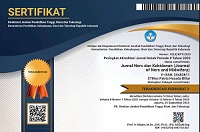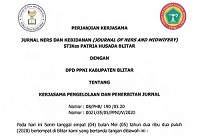Analisis Faktor Determinan yang berhubungan dengan Kepatuhan Rekomendasi Modifikasi Gaya Hidup Pasien Hipertensi
DOI:
https://doi.org/10.26699/jnk.v7i2.ART.p256-263Keywords:
Kepatuhan, Modifikasi Gaya Hidup, HipertensiAbstract
Penatalaksanaan farmakologis dan non farmakologis dipercaya dapat mengontrol tekanan darah dan mencegah komplikasi, tetapi banyak pasien hipertensi tekanan darahnya tidak terkontrol. Hal tersebut dikarenakan kepatuhan yang buruk dalam melaksanakan rekomendasi gaya hidup. Penelitian ini bertujuan untuk menganalisis determinan faktor yang berhungan dengan kepatuhan melaksanakan rekomendasi modifikasi gaya hidup. Penelitian ini menggunakan metode cross-sectional di pukesmas dinoyo Kota Malang tahun 2019. Teknik pengambilan sampel menggunakan Consecutive Sampling. Kuesioner yang digunakan meliputi : karakteristik demografi, pengetahuan dan rekomendasi mofifikasi gaya hidup pasien hipertensi. Hubungan antara rekomendasi modifikasi gaya hidup dengan variabel independen dianalisis menggunakan uji chi square dan analisis regresi logistik. 140 pasien hipertensi berpartisipasi dalam penelitian ini (60 laki-laki, 80 wanita). Prevalensi kepatuhan adalah 28,6 %. Tingkat pengetahuan berhubungan signifikan dengan kepatuhan melaksanakan rekomendasi gaya hidup (p=0,00). Jenis kelamin, usia, dan tingkat pendidikan tidak mempunyai hubungan signifikan dengan kepatuhan rekomendasi modifikasi gaya hidup (p= 0,06; p=0,21; p=0,87). Pengetahuan mempunyai hubungan yang signifikan dengan kepatuhan rekomendasi modifikasi gaya hidup.
Â
Management of pharmacological and non-pharmacological is believed to control blood pressure and prevent complications, Â but many hypertensive patients have uncontrolled blood pressure. This is due to poor adherence to recommended lifestyle modifications. This study was aimed to determine the factors associated with adherence to recommended lifestyle modifications of hypertensive patients. A cross-sectional study was conducted in Pukesmas Dinoyo Malang in 2019. Consecutive Sampling was used to select study subjects. The questionnaire included information about demographic characteristics, knowledge, practice of lifestyle-modification measures. Associations between adherence to lifestyle modification and independent variables were analyzed using chi square and multivariate logistic regression analysis. 140 hypertensive patients participated in the study (60 men, 80 women). The prevalence of adherence was 28.6%. The level of knowledge was significant associated with adherence to recommended lifestyle modifications (p = 0.00). Genders , age, and educational level were no significant associated with to recommended lifestyle modifications (p= 0.06; p=0.21; p=0.87). Knowledge was significant associated with adherence to recommended lifestyle modifications of hypertensive patients.
References
Akhter N. (2010) Self-Management among Patients with Hypertension in Banagladesh. Prince of Songkla University, Banagladesh; 2010.
Amado Guirado, E., Pujol Ribera, E., Pacheco Huergo, V., & Borras, J. M. (2011). Knowledge and adherence to antihypertensive therapy in primary care: Results of a randomized trial. Gaceta Sanitaria, 25(1), 62–67. https://doi.org/10.1016/j.gaceta.2010.09.015
Amaral, O., Chaves, C., Duarte, J., Coutinho, E., Nelas, P., & Preto, O. (2015). Treatment adherence in hypertensive patients-a cross-sectional study-NC-ND license (http://creativecommons.org/licenses/by-nc-nd/4.0/). Peer-review under responsibility of the Organizing Committee of. Odete Amaral et Al. / Procedia-Social and Behavioral Sciences, 171, 1288–1295. https://doi.org/10.1016/j.sbspro.2015.01.243
Beilin LJ (2004). Lifestyle modification in overweight hypertensives.Clin Exp Hypertens 2004;26:737–44
Guillen, M. H. J. L. (2018). Factors associated with the level of knowledge about hypertension in primary care patients. Medicina Universitaria, 19(77), 184–188. https://doi.org/10.1016/j.rmu.2017.10.008
Gudina K, Bonsa F, Gudina EK, Hajito KW (2014) Original article prevalence of hypertension and associated factors in Bedele town, southwest Ethiopia. Ethiop J Heal Sci. 2014;24(6):21–26.
Hardiyanti, Amiruddin, R., & Masni. (2016). Kepatuhan Minum Obat Terhadap Status Hipertensi Di Wilayah Kerja Puskesmas Bajoe Kabupaten Bone Tahun 2016. JST Kesehatan, 6(2252-5416), 375–380.
Ike, S. O., Aniebue, P. N., & Aniebue, U. U. (2010). Knowledge, perceptions and practices of lifestyle-modification measures among adult hypertensives in Nigeria. Transactions of the Royal Society of Tropical Medicine and Hygiene, 104(1), 55–60. https://doi.org/10.1016/j.trstmh.2009.07.02
Kang, C. D., Tsang, P. P. M., Li, W. T. L., Wang, H. H. X., Liu, K. Q. L., Griffiths, S. M., & Wong, M. C. S. (2015). Determinants of medication adherence and blood pressure control among hypertensive patients in Hong Kong: A cross-sectional study. International Journal of Cardiology, 182(C), 250–257. https://doi.org/10.1016/j.ijcard.2014.12.06
Lim, S.S., Vos, T., Flaxman, A.D., et al., (2013). A comparative risk assessment of burden of disease and injury attributable to 67 risk factors and risk factor clusters in 21 regions, 1990–2010: a systematic analysis for the Global Burden of Disease Study 2010. Lancet 380 (9859), 2224–2260
Okwuonu, C. G., Ojimadu, N. E., Okaka, E. I., & Akemokwe, F. M. (2014). Patient-related barriers to hypertension control in a Nigerian population. International Journal of General Medicine, 7, 345–353. https://doi.org/10.2147/IJGM.S63587
Putriastuti, L. (2016). Analisis hubungan antara kebiasaan olahraga dengan kejadian hipertensi pada pasien usia 45 tahun keatas. Jurnal Berkala Epidemiologi, 4(2), 225–236. https://doi.org/10.20473/jbe.v4i2.2016.225
Sacks FM, Svetkey LP, Vollmer WM, Appel LJ, Bray GA, Harsha D, et al.(2001) DASH-Sodium Collaborative Research Group. Effects on blood pressure of reduced dietary sodium and the Dietary Approaches to Stop Hypertension (DASH) diet.N Engl J Med2001;344:3–10. https://doi.org:10.1056/NEJM200101043440101
Sari, D., & Utami, G. T. (2017). Hubungan Motivasi Diri Terhadap Kepatuhan Melaksanakan Diet Pada Penderita Hipertensi Delima Sari 1 , Safri 2 , Gamya Tri Utami 3, 580–588.
Rigaud AS, Forette B. (2001) Hypertension in older adults. J Gerontol 2001;56A:M217-5
Tibebu, A., & Mengistu, D. (2017). Adherence to recommended lifestyle modifications and factors associated for hypertensive patients attending chronic follow-up units of selected public hospitals in Addis Ababa , Ethiopia, 323–330.
Wong, M. C. S., Jiang, J. Y., Tang, J. L., Lam, A., Fung, H., & Mercer, S. W. (2008). Health services research in the public healthcare system in Hong Kong: An analysis of over 1 million antihypertensive prescriptions between 2004-2007 as an example of the potential and pitfalls of using routinely collected electronic patient data. BMC Health Services Research, 8, 1–9. https://doi.org/10.1186/1472-6963-8-138
Wong MCS, Liu KQL, Wang HHX, Lee CLS, Kwan MWM, Lee KW, et al (2013) Effectiveness of a pharmacist-led drug counseling on enhancing antihypertensive adherence and blood pressure control: a randomized controlled trial. J Clin Pharmacol 2013;53:753-6. https://doi.org/10.1002/jcph.101
Yang, S., He, C., Zhang, X., Sun, K., Wu, S., Sun, X., & Li, Y. (2016). Determinants of antihypertensive adherence among patients in Beijing: Application of the health belief model. Patient Education and Counseling, 99(11), 1894–1900. https://doi.org/10.1016/j.pec.2016.06.014
Downloads
Published
How to Cite
Issue
Section
License
Copyright (c) 2020 Jurnal Ners dan Kebidanan (Journal of Ners and Midwifery)

This work is licensed under a Creative Commons Attribution-ShareAlike 4.0 International License.






